What is Google E.E.A.T in SEO? Here’s Why It Matters + 10 Strategies for Your Content Marketing
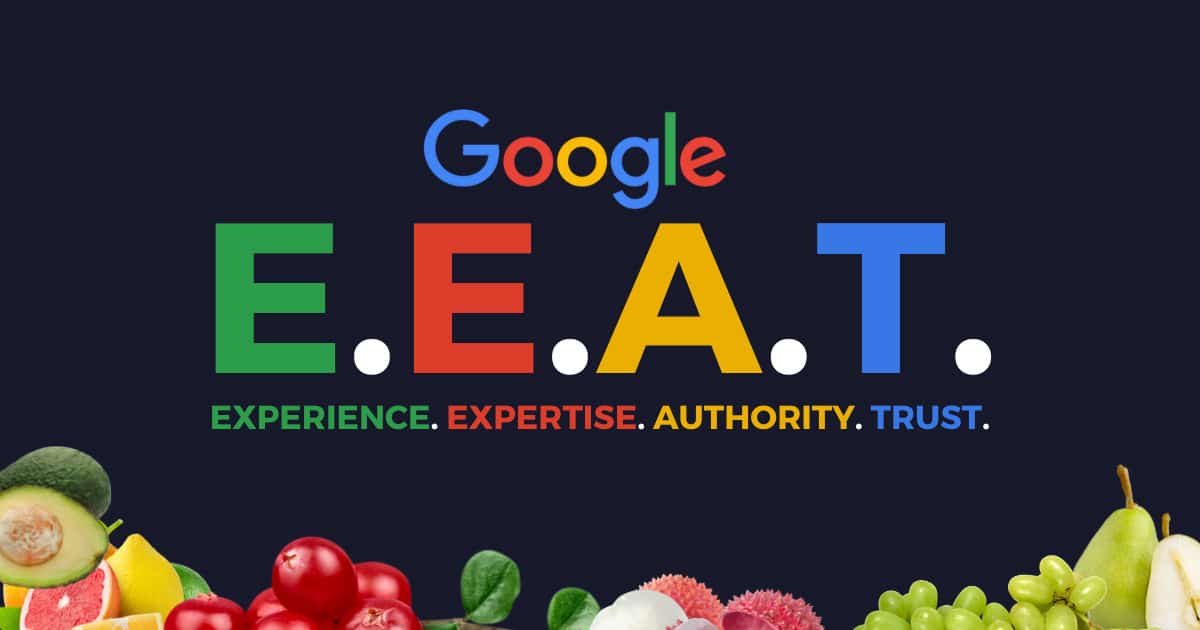
What is EAT in SEO and why should you care about it in content marketing?
EAT ensures you get the best answers possible to your most important queries.
When you run a Google search query, you expect the first page of results to include reliable content, right?
You might keep your guard up a bit as you sort through the results – just to be sure.
Overall, however, we expect Google to give us expert, authoritative, and trustworthy answers.
Think of it this way.
Let’s say you want to start planning for retirement so you Google “retirement savings options”.
If Google didn’t prioritize trustworthy content, you could find yourself researching predatory schemes and worthless stocks. One horrible Google search result could cost you thousands of dollars.
Just imagine the damage that exploitative or poor-quality content can do to physical, mental, or financial health.
That’s where EAT comes into SEO. Here’s what it means, how it works, and how to optimize your site.
What is EAT in SEO?
EAT is an acronym standing for Expertise, Authority, and Trustworthiness”.
No one knows for sure exactly how Google’s algorithms and humans decide which pages show up.
Google gives us some general guidelines, but the details are under tighter security than the nuclear codes.
Back in 2015, Google revealed its Search Quality Rater Guidelines. Technically, the guidelines were written to help Google’s human workers fill the quality gap that algorithms lack. Google made them public to help content creators understand how it ranks billions of websites.
It’s updated that same link as needed ever since.
Google says those are the quality guidelines in their entirety – but does anyone believe that? There’s a lot we don’t know too.
2023 Update: What is EEAT in SEO?
Since 2015, Google has made its Search Quality Rater Guidelines publicly available to help content creators understand how it ranks billions of websites. In July 2022, the guidelines were given a massive update that introduced an extra element to the equation: Expertise.
Now, Google’s updated EEAT (Expertise, Experience, Authoritativeness, Trustworthiness) guidelines emphasize the importance of expertise in ranking websites. It looks at the level of expertise of the content creator, the quality of the content, the authoritativeness, and the trustworthiness of the content creator when ranking websites.
According to the latest guidelines, experience is determined based on evidence of first-hand experience in the topic being covered. This can be done using supportive evidence, such as images or video clips of the writer explaining or demonstrating how to do something.
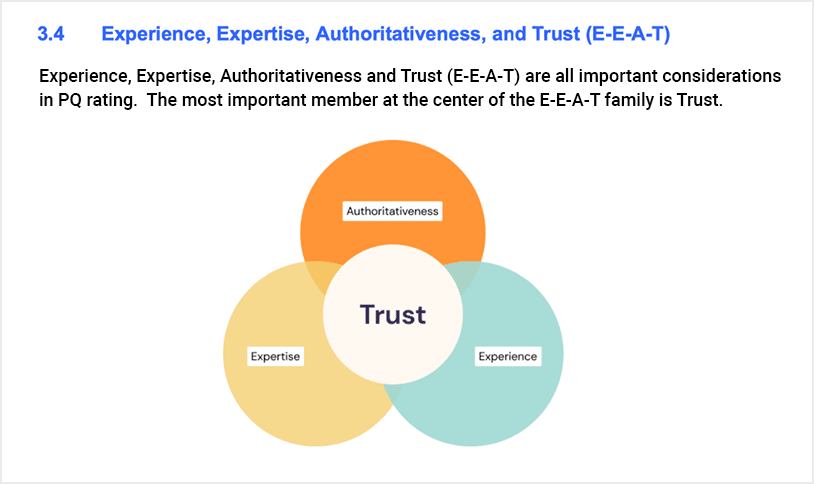
Google Search Quality Evaluator Guidelines page 27 (via Search Engine Land)
Understanding Google Search Quality Rater Guidelines
Google’s Search Quality Rater Guidelines dictate a three-factor process it uses to rate a page’s quality from low to high:
- Does the website serve a beneficial purpose? Does it aim to help and inform or mislead and even cause harm?
- Does the web page’s topic have a direct impact on someone’s physical, mental, or financial health/safety?
- For pages with a beneficial purpose, is the creator of high expertise, authority, and trustworthiness?
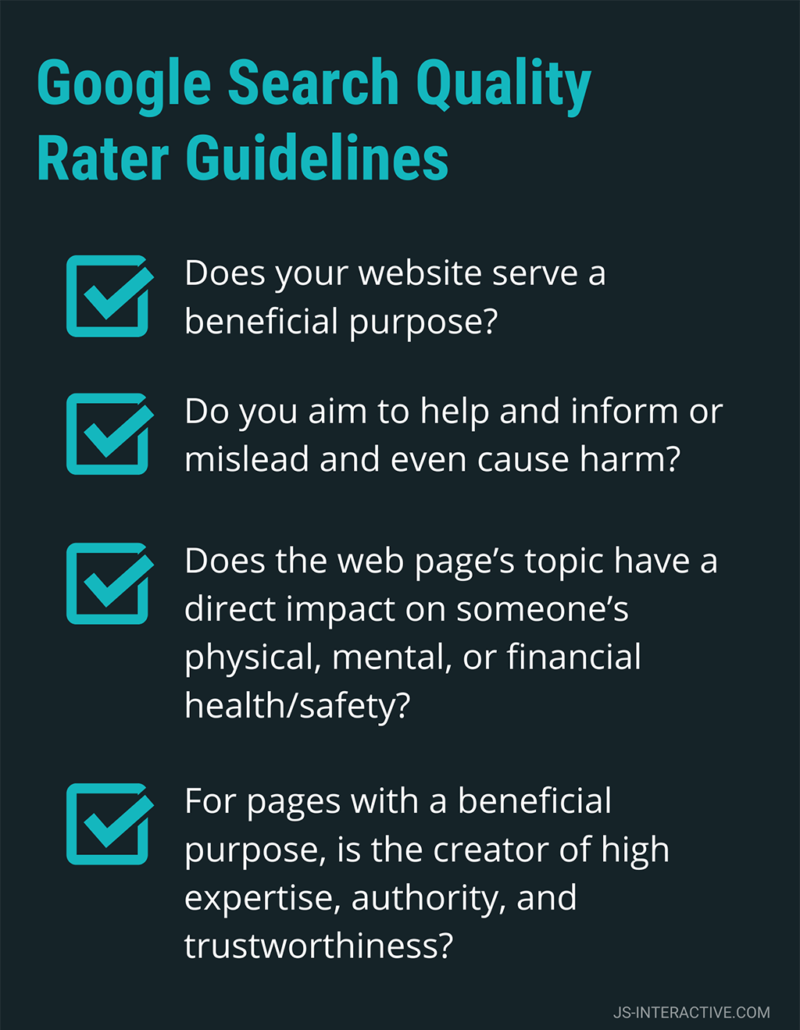
As Google says, every website should intend to help people, always:
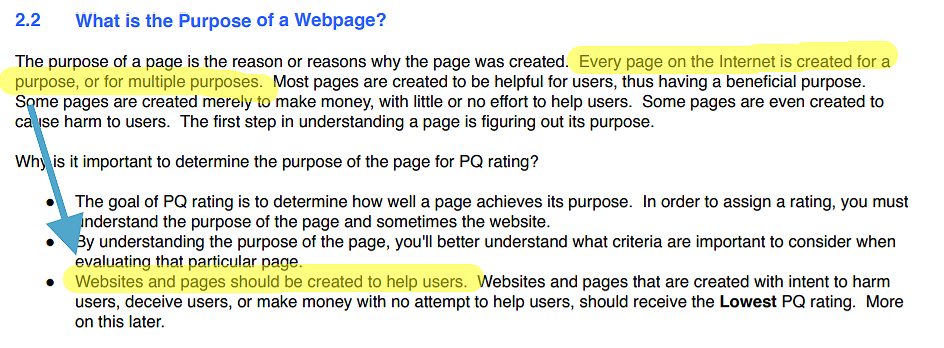
Why You Should Care About Google EEAT for SEO in Content Marketing
Some marketers say only medical or financial websites should care about EEAT in SEO.
Google, on the other hand, explains that all websites demand some degree of EEAT quality – even celebrity gossip, fashion, and comedy sites.
Bad fashion advice might not cause you physical harm, but it would make you go somewhere else instead of Google when you need style tips.
Google wants to answer every query as best as it can – no matter the topic – so high EEAT content matters in every single industry.
Google wants to answer every query as best as it can – no matter the topic – so high EEAT content matters in every single industry.
Plus, you’re not just creating content to please Google. You want to create expert, authoritative, and trustworthy content that is backed by proof of personal experience to earn the trust of your leads and customers.
Google’s EEAT and Search Quality Rater Guidelines help marketers understand how they can make the highest quality content for their website visitors.
What Does YMYL Mean?
While EEAT matters for all industries and websites, it’s especially critical for YMYL pages.
Your Money or Your Life isn’t just a famous Jack Benny quote – Google has revived it to describe webpages that have a serious impact on your safety, stability, or security.
Google takes its EEAT guidelines seriously when it comes to YMYL sites in industries like:
- Medical advice
- News and current events
- Scientific topics
- Financial advice
- Home Remodeling
- Government business
- Car repairs
- Parenting
For web pages in these industries, Google demands a few things depending on the context. They must be:
- Written or reviewed by an expert
- Factual
- Updated regularly
- Written with professional integrity
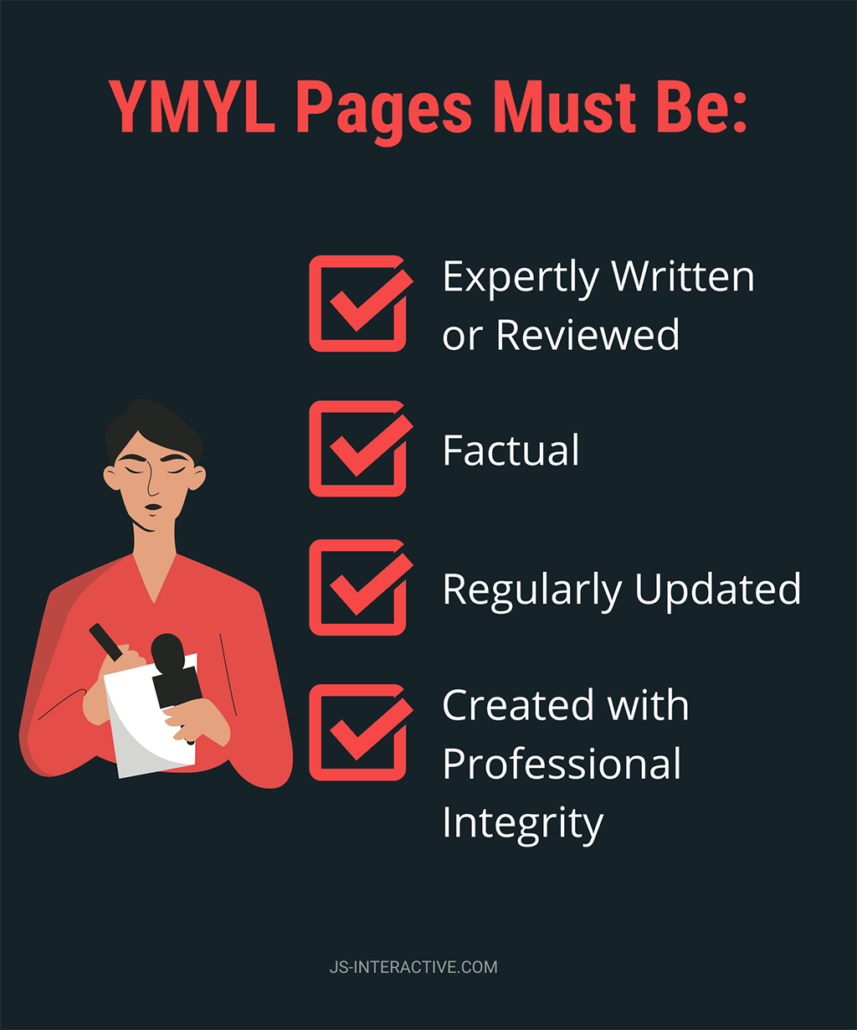
Don’t worry. Google isn’t punishing everyone who doesn’t have a doctorate in their field – or even a bachelor’s degree. Google knows informal expertise can be just as valid as formal recognition.
Like Google says, niche forum discussions, product reviews, and even personal experience can qualify as expertise.
It completely depends on the purpose of your website, how you portray yourself, and how well you prioritize improving people’s lives.
Niche forum discussions, reviews, and personal experience can all qualify as expertise.”
What Isn’t EEAT in SEO?
Do you have a better answer to the question, “what is EEAT in SEO” now? Slow down for a second because lots of people misunderstand how EEAT works in SEO.
It might be easier to understand what EEAT in SEO isn’t.
Lily Ray at Amsive Digital effectively breaks down a few misconceptions about YMYL SEO and EEAT as a ranking factor:
- EEAT isn’t an explicit ranking factor. EEAT ’s impact on your rankings is more indirect.
- It doesn’t replace technical SEO. You still need to optimize your pages and keywords. EEAT just guides your quality standards.
- You can’t change your EEAT overnight. It takes time to prove yourself. You can’t fix it immediately or make small changes to boost your rankings right away.
10 Strategies to Optimize Your Content Marketing’s EEAT for SEO
The million-dollar question: How can you improve your EEAT for SEO and customer trust?
We’ll use Healthline as our main example. They survived the infamous Medic update because they publish high-EEAT content.
1. Run an EEAT Audit
Get existential for a minute. Why does your website exist?
What purpose does each page serve and how do you help people?
Healthline helps people understand and improve their health with straightforward content and resources:
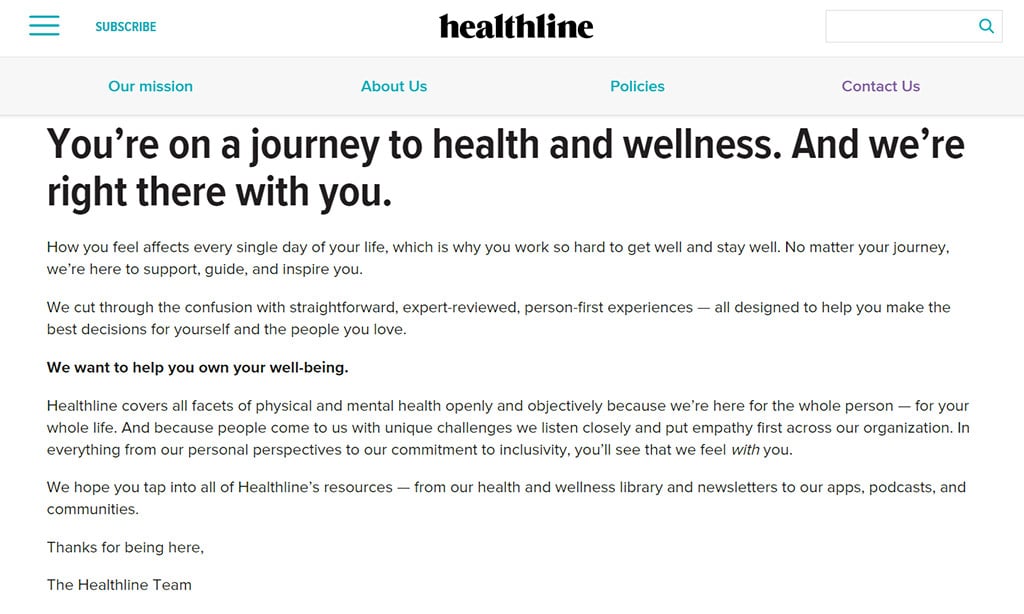
Even better, each article that is published is medically reviewed by real doctors and healthcare experts, which is a huge advantage for them and their audience. Not only will these articles help people better understand their health, but Google will be able to easily recognize that the content is trustworthy and useful as it’s been vetted by experts in the field.
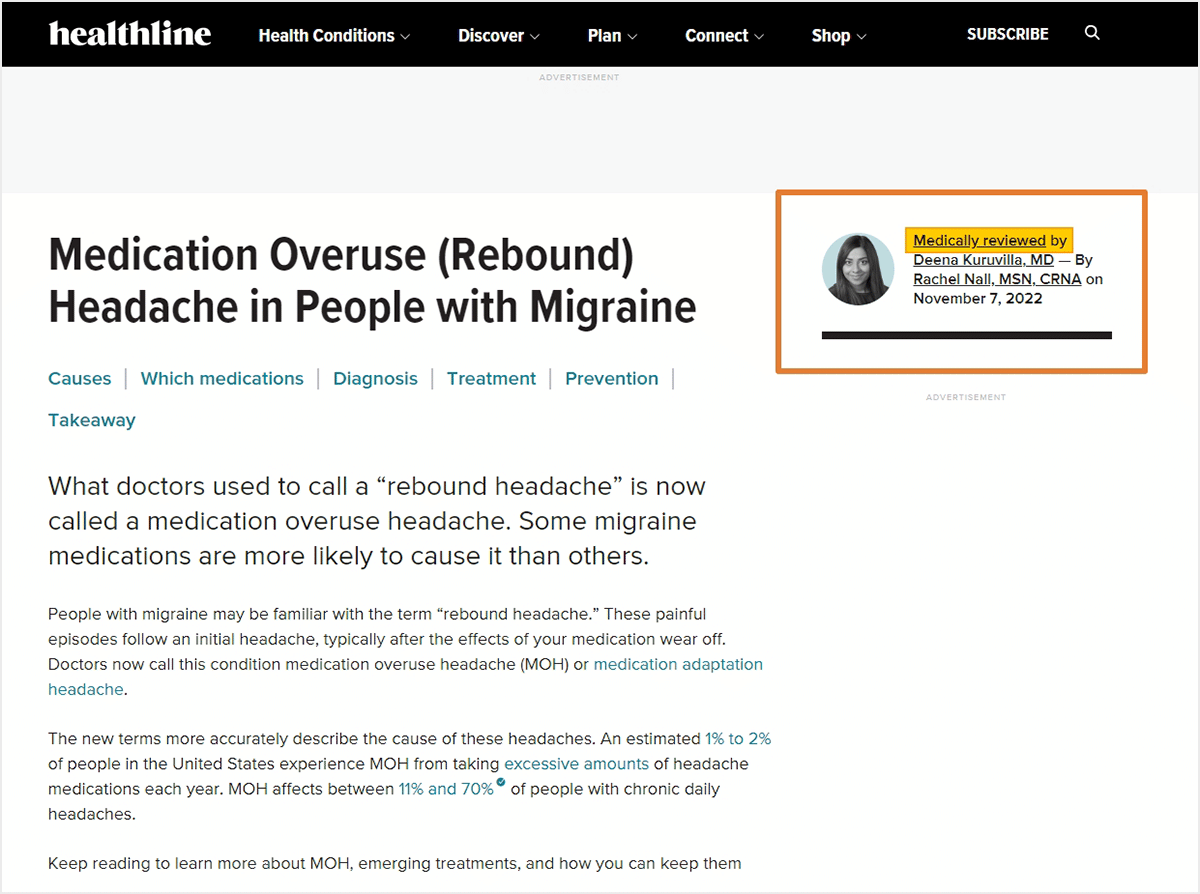
2. Hone Your Bios and Authorship for E-E-A-T
Google needs to understand why you deserve to show up in the search results for certain topics.
Use your bio and About page to explain why your opinion and information are legitimate. Set up a Gravatar account to keep your bio consistent across all WordPress websites.
Healthline has an entire Medical Affairs team:
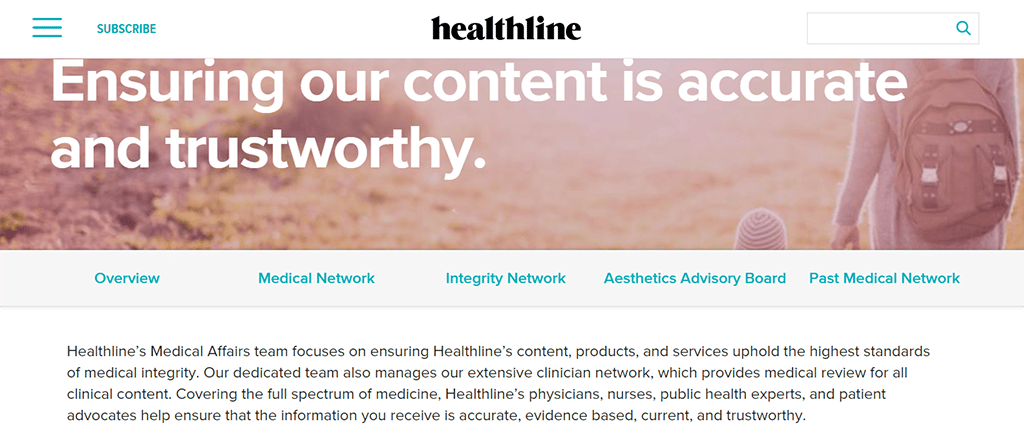
3. Optimize Your Local SEO
In 2019, 46% of all searches sought local information. With COVID-19 restrictions, that’s no doubt skyrocketed.
Optimizing your local SEO and Google My Business listing shows you’re a legitimate operation and not some fly-by-night scammer.
Healthline has claimed and optimized its auto-generated Google snippet:
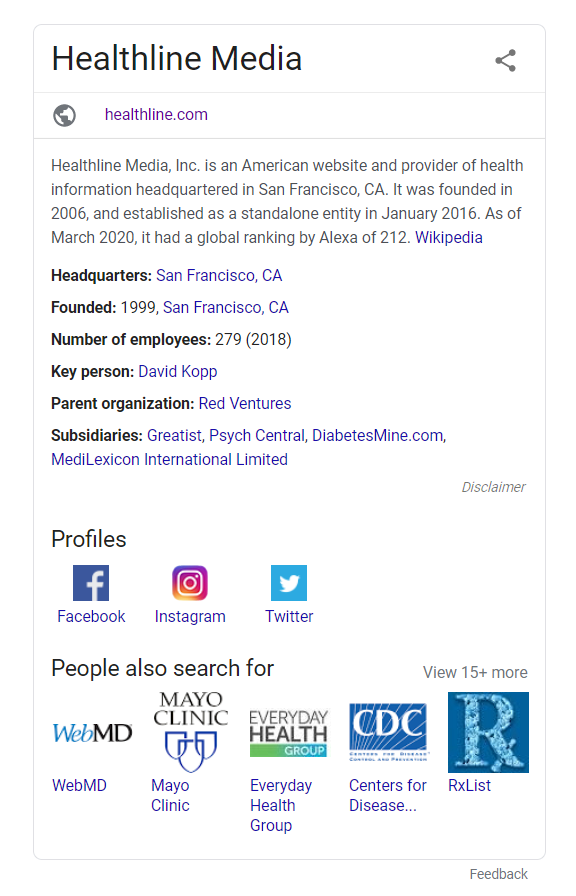
4. Improve Your Branding
Anything that improves your overall reputation is good for EEAT.
Google might not use social shares and engagement to rank your site, but social selling does boost your traffic and demonstrate your expertise.
Google will notice the increase in traffic, time spent on your site, and backlinks as it judges your authority.
If you’re a new brand, consider publishing some original interviews with subject matter experts to show people why they should trust you.
5. Prioritize Collecting Reviews
91% of people read reviews and 84% trust them as much as a friend’s recommendation. We should assume Google reads reviews too to gauge your trustworthiness.
Plus, reviews can show up in search results for your brand.
However, it’s also important to point out that while collecting reviews is good, you should be trying to collect authentic reviews that can prove that the user had first-hand experience with your business.
After all, Google states that trust is the “most important member of the E-E-A-T” framework because, and that more people are willing to trust the content author (even testimonials) where it’s clear the individual has had first-hand experience using the product or service, as a verse to a testimonial that states an opinion with no proof that the author has used the product or service.
A great way to avoid this issue is to encourage customers to leave reviews that have photo or video evidence. This is a great way for those in the B2C space to prove experience when publishing content.
Now, for those in the B2B space who have a bit of a harder time gathering testimonials that can be proven with image or photo evidence, you can take things up a notch by creating case studies that showcase how your product or service has helped your clients.
This allows you to share the results of real-world experiences and can play a significant part in showing Google not only that you have relevant experience to share, but also helps to build trust, credibility, and authority in your given niche.
6. Get Your Website Security Squared Away
Every website needs an SSL certificate to prove its legitimacy and keep visitor information safe. Google does prioritize HTTPS sites with SSL certs in rankings.
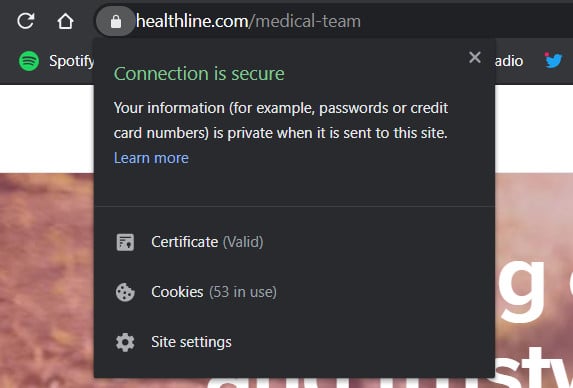
7. Focus on Genuine Link Building and High-Quality Outbound Links
Google pays attention to backlinks as it judges your website’s authority and trust. Most people tend to use high-quality content as source material, right?
Don’t farm or spam backlinks – Google considers that a BIG no-no. Instead, focus on creating genuine connections and earning backlinks with quality content.
On the flip side, Healthline takes its outbound sources seriously too:
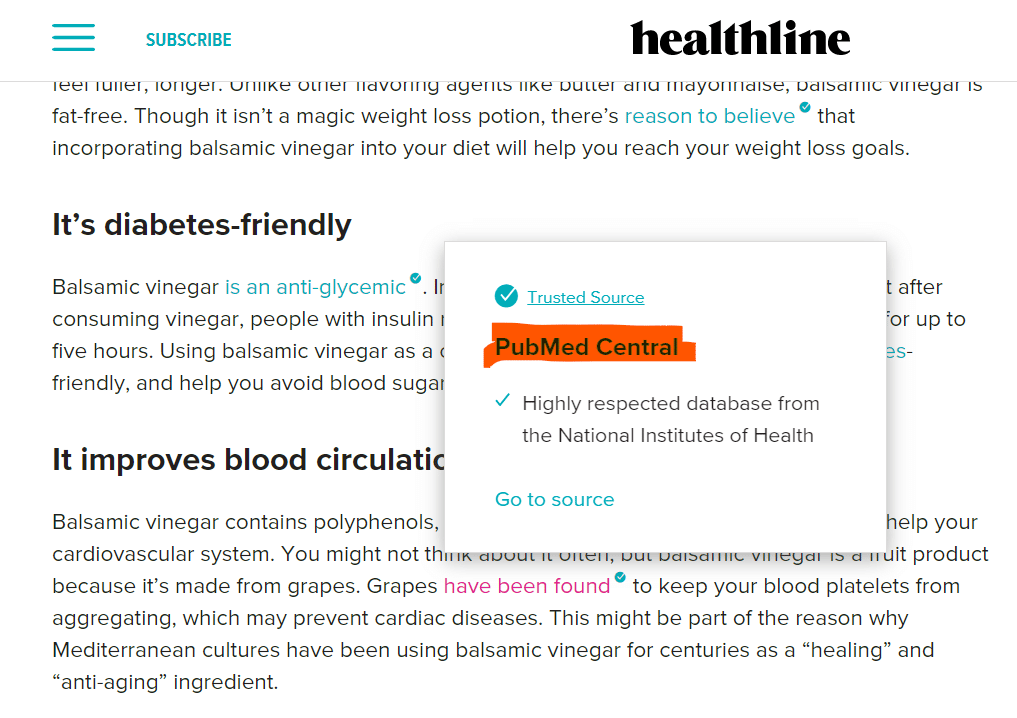
8. Radiate Transparency
What makes you trust a website? Better question: What makes you distrust a website?
Probably several things, but the general theme among untrustworthy sites is a lack of transparency.
For EEAT purposes, your site should proudly display these things without any misleading language:
- Return and refund policies
- Shipping methods, location, and times
- Physical address
- Privacy policy
- Terms of service
Additionally, you want to show your brand’s human side with real names and photos of your team. People are more likely to trust a website when it displays photos of real people. Don’t use stock photos here – original photos of real team members are best.
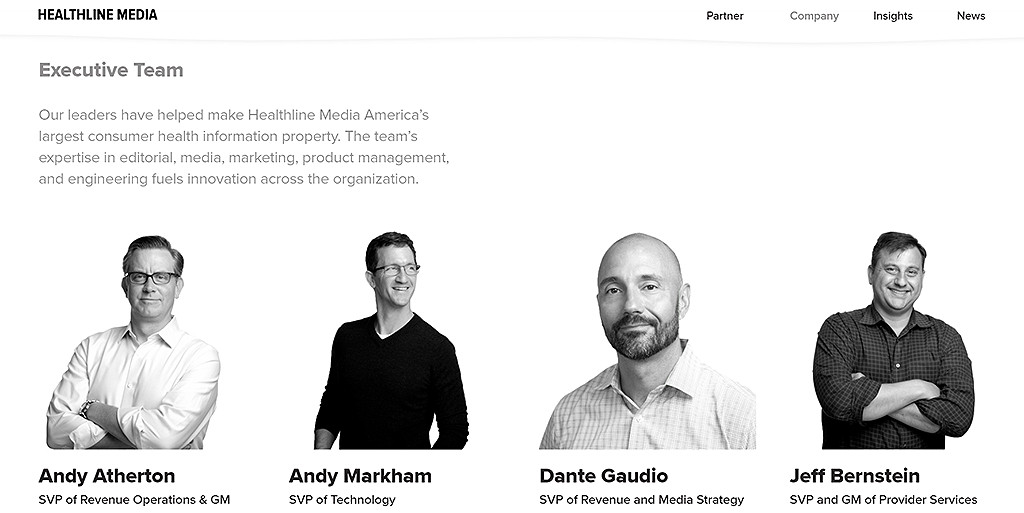
9. Make Yourself Available
Show customers and Google that you’re available to talk if anyone has a question or problem with things like:
- Phone number
- Relevant email addresses
- Live chat or chatbot
- An FAQ page
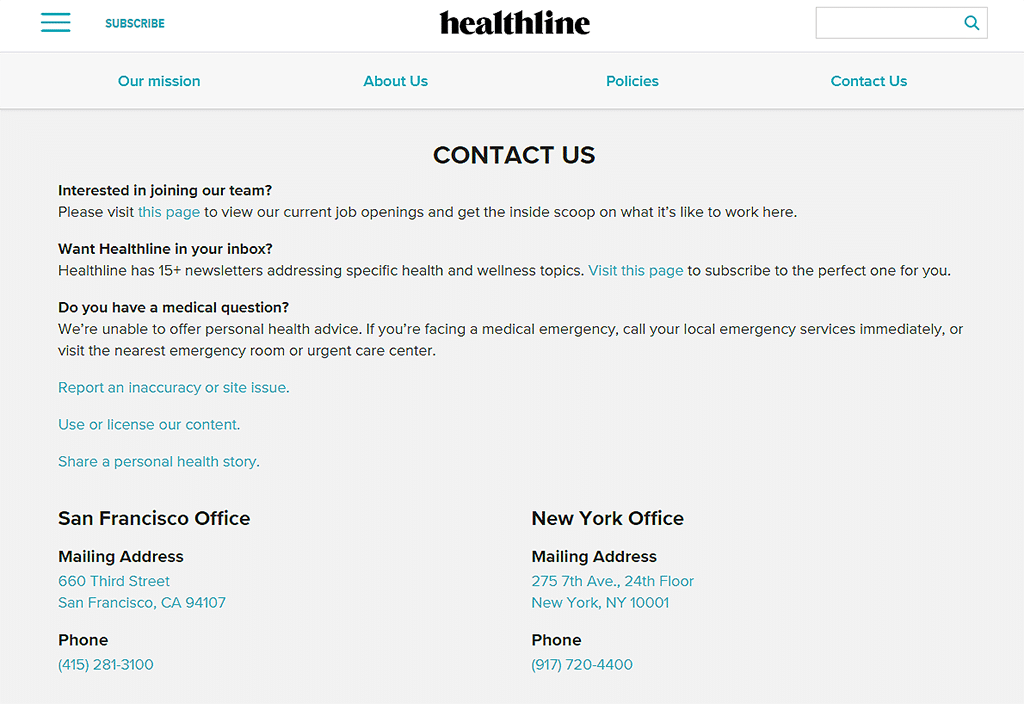
10. Always Create the Best Content Ever
This is really the bottom line of EAT. It’s not about gaming the Google system. It’s about creating content that helps people by solving their problems or improving their lives.
It’s not about gaming the Google SEO system. EAT is about creating content that helps people by solving their problems or improving their lives.”
It’s more important than ever to take the time and ensure that you are focusing on using your unique personal experience and professional expertise and showcasing it whenever possible – whether it be through video/image evidence, a detailed author bio, etc. Don’t forget linking to authoritative sources is a very important part of the equation because it also helps to legitimize your work.
Every piece of content you create should:
- Serve a specific purpose
- Benefit the reader in some way
- Contain relevant, updated, and factual information that is backed by links to authoritative sources and real-world data/evidence.
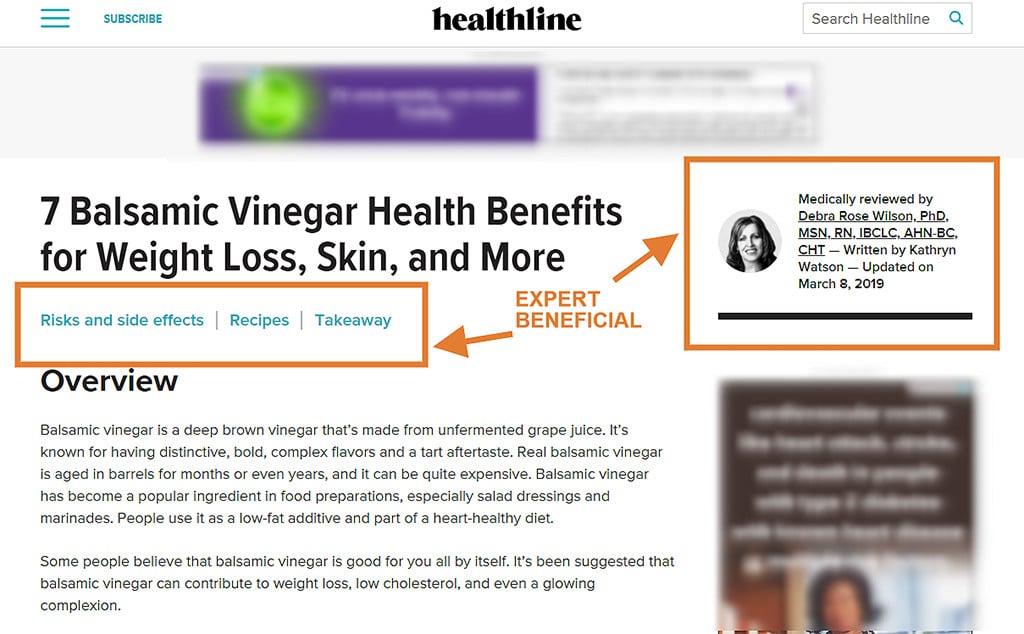
What is EEAT in SEO: Your Quick E-A-T SEO Checklist Takeaways
To wrap up, Google judges your website’s purpose and quality through EEAT guidelines. They’re not set in stone, but you can take steps to improve your EEAT in the long term.
Some important strategies include:
- Prioritizing website transparency and security
- Thoroughly explaining your authorship and industry expertise
- Earning recognition through links and traffic
- Always creating content that strives to improve people’s lives.
You’re not just trying to rank in Google with EEAT. You want to earn the trust of readers, leads, and potential customers – no matter your industry.
Need some guidance on how to create SEO-friendly, helpful content? Let’s discuss your biggest challenge.